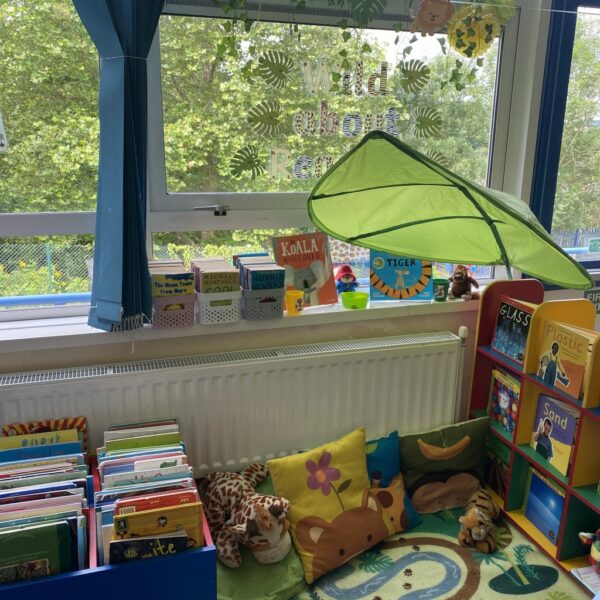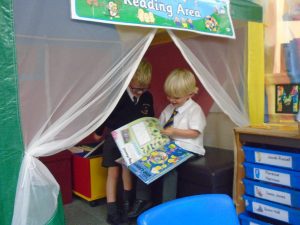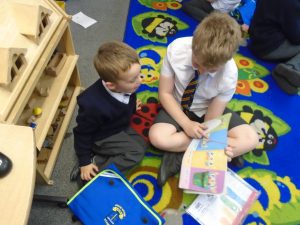Reading – Progression of Key Skills and Knowledge
Please contact school if you would like to view our Twinkl Phonics Progression Map
Aims and Objectives
At St Mary’s we believe that the ability to read is fundamental to pupils’ development as independent learners, during their time at school and beyond. Reading is central to our ability to understand, interpret and communicate with each other and the world around us. Therefore, reading is given a high priority at St Mary’s, enabling the children to become enthusiastic, independent and reflective readers across a wide range and types of literature, including different text types and genres, book, posters, magazines, signs and newspapers. Reading is a complex skill with many components. Successful approaches to the teaching of reading should encourage children to use a variety of strategies in their pursuit of meaning.
The objectives of reading at St Mary’s Catholic Voluntary academy are: –
- To become fluent, confident and expressive readers
- To read with enjoyment across a range of genres
- To read for pleasure as well as for information
- To read and respond to a wide range of different types of literature
- To understand the layout and how to use different genres and text types
- To understand and apply their knowledge of phonics and spelling patterns and use this to decode words with accuracy
- To build their bank of sight words to enable fluent reading
- To have an interest in words and their meanings, developing a rich and varied vocabulary
- To understand and respond to literature drawn from a range of cultures and literacy heritage.
Reading for Pleasure
At St Mary’s, we believe that creating readers with a passion for a wide range of materials will ensure that children’s love of reading will extend far beyond the classroom and allow them to build on their skills independently through a curiosity and thirst for knowledge.
We believe that the following principles are at the forefront of our approach to promoting a love of reading:
- Each classroom contains an attractive reading area which contains a range of age appropriate texts as well as texts that will stretch and challenge.
- Reception pupils will have the opportunity to read alongside their special friends in Year 6, once per week.
- Each year, one of our Year 6 teams will be called the Education Guardians. These pupils will lead reading events across the school and take care of the school library.
- In Pentecost term, we will invite the local librarian in to school to talk in Friday assembly about the Summer Reading Challenge.
- We will take part in the Stockport Book Awards, ensuring that all classes have the opportunity to read the shortlisted books. We will also send a group of pupils to the awards ceremony in Advent term.
- Each year, we nominate a key stage 1 and key stage 2 reader to receive a prize at the Stockport Book Awards for either their determination or passion for reading. Certificates for reading will also be awarded in whole school assemblies.
- Pupils are engaged in home reading through exciting challenges and tasks such as reading bingo.
- All classes have a regular story time each day, during this time they will either read a picture book from their reading area or part of a chapter book.
- DEAL (Drama Engagement Active Learning) strategies will be used to create a language rich learning environment.
- As a whole school, we will celebrate world book day each year with exciting activities such as a book swap, book themed disco and story sharing.
- Throughout the week there will be opportunities for all ages for free reading.
- Whole school assemblies may use books to engage the pupils in local and global issues/events.
- Annually, we aim to host a school book fair to engage pupils in home reading and to raise funds to replenish the school library.
- We have regular story time sessions in the school library at lunchtime.
- We will have whole school writing week each year, where all pupils will share the same stimulus of a new text.
How the Subject is Planned
We use the National Curriculum and the Twinkl Phonics programme as the basis for our planning in Phonics and Reading. We have planned for progression and development, so that the children are increasingly challenged as they move through the school.
Foundation Stage and KS1
Reading and Phonics at St Mary’s is taught through the Twinkl Phonics programme from Nursery through till Year 2. Pupils are taught age-appropriate phonic knowledge. Gaps in pupils’ phonic knowledge are addressed through individual and small group intervention work. Adaptions are made to phonic learning for pupils who are progressing through the programme at accelerated rates. Lessons are engaging and promote a love of language play and acquisition.
Key Stage Two
In Key Stage 2, high quality texts are picked linking to the topics covered in that year group. These texts are used for whole class and group reading to develop the children’s comprehension and are also often used as a stimulus for writing.
Teaching Approaches
Reading and Phonics is managed in such a way as to facilitate different styles of learning.
Opportunities are made for pupils to:
- Read books aloud and discuss them
- Extend vocabulary with word games and morphemic knowledge to extend vocabulary from known words
- Learn collaboratively and share their thought processes
- Answer questions to develop comprehension skills
- Listen to the teacher model key reading skills, e.g. inference-making by thinking out loud
- Focus on decoding and phonological awareness
- Take part in whole class reading activities where the teacher models reading aloud and the pupils read with the same level of intonation
- Repeated reading of the same passage until suitable fluency is reached
- Individual and small group reading activities with a focus on fluency
Marking, Feedback and Reporting
Feedback is an integral part of all lessons; it is an essential tool to enable pupil’s progress. A range of feedback used during reading and phonics:
Peer Feedback – Within all lessons, pupils are given an opportunity to feedback to each other, whether it is during phonics on the carpet or in guided reading groups. Pupils are given the opportunity to discuss their learning and understanding with each other.
Teacher Feedback – Verbal feedback is given throughout all lessons. Teachers are giving feedback to pupils as they continually assess their learning. This is evident through 1:1, small group and whole class reading.
Self-Assessment Feedback – Pupils are encouraged in every lesson to self-assess. Targeted questions are given to the pupils to help them analyse and assess their own learning and identify areas for further improvement and development.
Half -termly assessments are made of pupils’ progress in reading and phonics in order to establish the level of attainment and progress and to inform future planning. Reading and phonics data is reported to parents at parents evening and in the children’s annual reports.
Cross-Curricular
Staff are encouraged to develop cross-curricular links with phonics, reading and other subjects to provide a relevant and meaningful curriculum for pupils.
Links to Community, Locality and Trips
- We have strong links with the Stockport library service. We have an ambassador from the library visit the children in assemblies to promote reading and the local library.
- We have opportunities for the classes to visit the local library.
- We have a group of pupils in Year 6 who are ambassadors for reading across the school.
- Annually, these children attend the Stockport Book Awards.
Role of the Subject Leader
The Subject leader has a variety of roles. These include:
- Taking the lead in policy development and quality assuring the planning, delivery and assessment of phonics and reading
- Supporting colleagues in their development and implementation of the teaching of phonics and reading
- Monitoring progress in phonics and reading and advising the Senior Leadership Team and
- Governors on action needed
- Using release time to support colleagues and disseminate information
- Auditing resources, monitoring and directing the spending in relation to the subject
- Keeping up-to-date through research and continuing professional development and attendance at phonics and reading co-ordinators meetings






